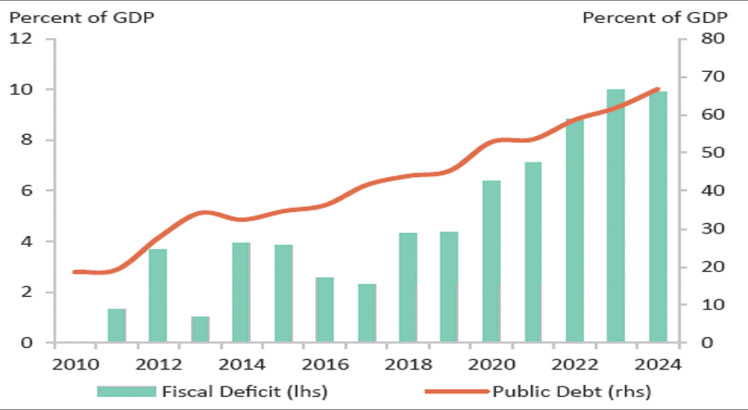Fiscal year opens with k95.2bn deficit
Government recorded a K95.2 billion deficit at the start of this financial year in April, a jump from K4.2 billion recorded in March, Reserve Bank of Malawi (RBM) figures show.
The figures, contained in the April Economic Review Report, show that the April deficit was, however, lower compared to a K127 billion deficit recorded in the corresponding month in 2022.
RBM said the deficit was explained by a revenue decline in the month against increased expenditure.
During the month, the figures show that total revenues decreased by 18.2 percent or K41.4 billion to K185.8 billion from K227.2 billion realised in March 2023, due to a drop in non-tax revenues and grants.

Said the bank: “Non-tax revenues decreased by K2.1 billion to K2.8 billion while grants declined by K73.8 billion to K28.9 billion. On the other hand, tax revenues had increased by 28.8 percent (K34.5 billion) to K154.1 billion during the review month.”
In terms of expenditure, the figures show that central government expenditures increased by 21.1 percent or K48.9 billion in April to K281 billion up from K232.1 billion recorded in March 2022.
Fiscal deficit—a situation when a government’s total expenditures exceed the revenue that it generates, excluding resources from borrowings— has become a norm where the government has consistently reported deficits in its financial plans.
Meanwhile, in the current budget, Treasury has projected a fiscal deficit of K1.3 trillion, an equivalent of one-third of the K3.87 trillion 2023/24 National Budget.
At K1.3 trillion, the fiscal deficit is 8.7 percent of GDP and below the recommended threshold of three percent.
The deficit, which counters one of the budget objectives of containing the deficit, is also coming on the back of rising public debt, now at K8.3 trillion as at December 2022, with interest payments pegged at K917.9 billion.
University of Malawi economics lecturer Lucius Cassim earlier described the widening deficit as an unfortunate occurrence.
He advised Treasury to forgo spending on things that are not necessary and prioritise expenditures that grow the economy, rather than bleed it.
“If we reduce borrowing, it means we will also reduce the deficit,” said Cassim.
In its assessment of the 2023/24 National Budget, the Economics Association of Malawi (Ecama) also expressed fears that the budget deficit is on the higher side, stressing the need for policies to contain the same.
“We continue to have expenditure slippages on some lines, below projected revenue collections due to energy challenges facing industry,” said Ecama in its assessment report.
However, Minister of Finance and Economic Affairs Sosten Gwengwe in the 2022/23 National Budget statement said the government continues to ensure that the fiscal deficit is minimised.
In Malawi, experience has shown that fiscal deficits have been financed mainly by costly domestic borrowing.
The rising domestic financing since 2018 as well as borrowing from regional development banks on non-concessional basis has since significantly increased Malawi’s public debt which stands at K7.9 trillion.





